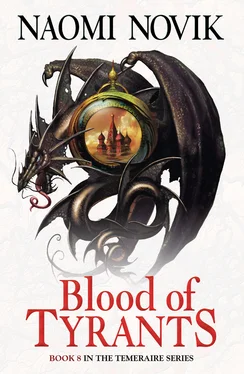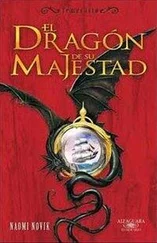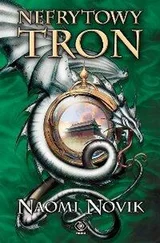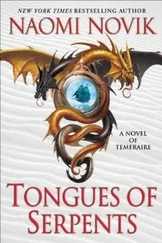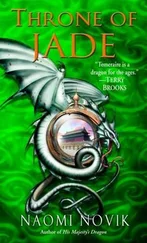Of course it could be done with prize-taking—Temeraire knew that, and Iskierka was forever nagging after finding some, but Laurence did not really approve of that. A prize taken legitimately, in the course of one’s duty, he thought was very well; hunting after prizes for their own sake he frowned upon. Laurence would not be satisfied, if he were to ask where Temeraire had got the funds—and he would ask, Temeraire was glumly certain—should he hear, as answer, by taking prizes. And Temeraire had forfeited his own share of the perfectly correct prizes which he and his company had taken during the invasion of Britain, when he had been transported away with Laurence; those had all gone to building pavilions, back in Britain.
“I had a good bit from the tribe, when we formed the firm, which I have since bought out; but of course they would not go in with me until I showed I could raise some funds of my own,” Wampanoag said. “I began with doing some cross-country carrier work, for other firms, and when I had shown I was a steady fellow and was not going to go haring off with someone’s cargo, good old Devereux gave me my chance and hired me to be agent on one of his Indiamen, with two points of interest. When I had realized my share from that journey, the tribe went in with me, and Devereux’s third son, and Pickman, to outfit our first ship; and we have done pretty well for ourselves since.”
“Cross-country,” Temeraire said, latching on to the first part of this nearly incomprehensible narrative, “—across your own country?”
“From Boston to the Kwaikiutl, on the West Coast,” Wampanoag confirmed. “It’s a good deal cheaper, you know, to carry things dragon-back instead of sailing all the way round.” Then he sat back and looked at Temeraire with a tipped head. “I beg your pardon, am I being a dullard? Are you looking for work? There’s not quite so much call for heavy-weights in shipping, as the cost of your feed is difficult to make back; but there is a particularly fine timber, on the West Coast, which I have been thinking might make it profitable to get a big fellow aboard.”
“Why,” Temeraire said, brightening, “that is very kind of you: how long a flight is it?”
“Not above a month,” Wampanoag said, “once you are in Kwaikutl lands: that is three months’ sailing, from here.”
“Oh,” Temeraire said, “I do not suppose I can: we cannot leave the war for four months. And then we should have to get back, ” he added, and sighed a small sigh; he ought have known that it could be no easy matter to build up a fortune, or else everyone would have done it already before now.
“But anyone can do this?” Dulcia ventured, from Maximus’s back: they had all been listening raptly.
“If you know your book-keeping, so you cannot be cheated; and will do steady work,” Wampanoag said, “and if you don’t mind an empty belly now and again, and you are steady about avoiding fights and trouble and fuss, and showing away,” rapidly diminishing the luster of the enterprise as he went on.
“An empty belly?” Maximus said, and snorted. “That is not for me: anyway we do very well, Temeraire. We do have pay now, you know, and it stacks up quite agreeably, when you ask to see it in coin.”
“No—yes—I suppose,” Temeraire said, though regretfully. “Still it is very generous of you to offer,” he added to Wampanoag, “and I am very flattered, I am sure: will you stay to tea, if you please?” He saw with great relief that Gong Su was coming back up to the dragondeck with several of the galley cooks, the ship’s boys carrying handsome brass bowls polished to a shine and steaming cauldrons of food, and upon a rack dripping over porridge the roasted goat, with what smelled like some fish liver in sauce to give it some interest.
“Thank’ee, I don’t mind if I do,” Wampanoag said. “If I am not putting you out: I can see you are crowded a bit,” a sad understatement: Maximus was curled over all of the deck where Temeraire was not, and all the others heaped atop them both, whenever they were not aloft or swimming.
“We do very well, pray do not think anything of it,” Temeraire said, of course.
“I suppose you fellows have come from England? Have you the latest news of the war?” Wampanoag asked, when they had settled themselves and begun to eat: there was of course fish and rice, to eke out the goat, but Temeraire had made sure—frowning down both Maximus and Kulingile—that Wampanoag received a haunch entirely for himself, as the courtesy due a guest.
“We have come from Brazil,” Temeraire said, “and we have only a little news from there: the Incan Empress has married Napoleon, and we suppose gone to France with him.” He hurried through this part of the story, and added, “But far more importantly, the Tswana have quite cast him off—they have made peace, in Brazil, and they do not mean to help him make war there any longer.”
He finished on this, as the best note of triumph available; although the situation in Brazil had by no means been quite so settled as all that at their departure. The Portuguese owners had been as laggard as they could in freeing many of their slaves, and those released had not all been perfectly happy to find themselves subsequently claimed as the family of the Tswana dragons, however much cherished by the same. But so far the arrangement had held, at least in name; they had remained in Brazil several months to see it established, despite all their urgent wish to be on the way to China, and Temeraire counted it yet as a success.
“Why, that is very interesting, there,” Wampanoag said, thoughtfully, though not as impressed as Temeraire might have liked by the news from Brazil, and rather more interested in the Incan side of things, asking, “Do they have so much gold and silver as they are supposed to do?”
“ Heaps, ” Iskierka said, with a resentful and significant eye on Temeraire: she had not ceased to mutter quietly, where Granby could not hear, how much better everything should have been if he had married the Incan Empress instead, as she had busily tried to arrange. Temeraire paid her no mind. Granby had not wanted to marry the Empress at all.
“I must try and lay in some stock of silk, then, and pottery,” Wampanoag said, which Temeraire did not follow at all, though he was too polite to say so; but Kulingile was not so shy of asking, and Wampanoag willingly explained, “Why, cotton will be cheaper soon, with this peace with the Tswana: the South shan’t be looking to the sea-lanes and fearing to send out any ships, and gold and silver won’t buy as much, if there is more to be had floating around. I will buy ten thousand dollars’ worth of silk now, if I can get the Japanese to give it to me, and sell it for a hundred then: see if I don’t.” He gave a very decided nod.
“That,” said Churki, when Wampanoag had flown back to his own ship, after tea, “is a highly respectable dragon, I am sure. And you see how many people he has, all his own! I wish you had asked him more about this tribe of his,” she added, with a slightly censorious note, “instead of thinking only of his money. Money is very well and one must have enough, but it is not all that matters.”
“That is not why I asked him, at all,” Temeraire said, loftily, and well-pleased with the success of his opening gambit, swallowed his medicine in better spirits, and put himself to sleep with his new and private hope: if he could not go and find Laurence, and his friends could not, perhaps someone else might.
“He is just an Englishman going to Nagasaki,” Kiyo said, eating a quarter of beef. “I am taking him as far as Seto. Pass that hot sake, if you please,” she added to the headman, or something along those lines, Laurence gathered, picking out a few words and seeing the village chief looking between him and her helplessly and then turning to have the bowl of hot wine before her refreshed from a heated kettle.
Читать дальше
